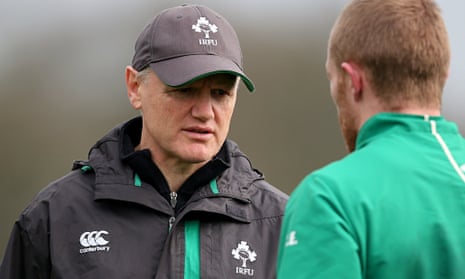Read some of the things said about Joe Schmidt and the next step for Ireland’s coach is to cross the Liffey without the help of the Ha’penny Bridge. Beat England and canonisation is surely an option.
Is Schmidt the best coach in Europe, the world even? There are plenty who think at least the former – and not without reason. Consider his record in four seasons coaching in Ireland: two Heineken Cups, a Six Nations Championship at the first attempt and, if he wins again in Dublin on Sunday, he’s favourite for a second.
There were also wins over Australia and South Africa, and in his second game in charge Ireland came within a whisker of beating the All Blacks. Clearly there is plenty to shout about but look a little closer and it’s the manner of the man that is impressive. Simply, there is no magic formula; Schmidt just seems to do most things better than anyone else.
Back in my days at Sky, I saw plenty of those Leinster wins in Europe and had the time and the technology to examine the detail, particularly the number of times when, in the first 20 minutes, Leinster would nail a move so perfectly.
Going through all the component parts, the little interactions between Leinster players and between those players and the opposition, there was a feeling of perfect planning, almost an inevitability about the upcoming try. Rugby as chess if you like.
Talk to those involved, those around Schmidt in those days, and that impression is confirmed. The coach has a simple game in mind but on to that he grafts moves of considerable complexity that require not just the total understanding of his own players – their role either passive or active, even their body language – but almost the complicity of the opposition. Schmidt the great manipulator.
He seems able to anticipate better than most the reaction his players’ actions will have on the opposition and then goes about explaining to those players, either singly or collectively, what he expects of them. He’s good at it; it’s the former schoolmaster in him.
He also analyses games in considerable detail and has the communication skills to pass on that knowledge. So much so that when Schmidt took the Ireland job, Brian O’Driscoll extended his Test career by a year, saying: “I’ve never seen a coach with such a smart rugby brain.”
O’Driscoll was rewarded for his faith by last season’s Six Nations but if any game gets to the heart of what Schmidt is about, it’s probably the first of the post-BoD era: last autumn against South Africa.
Actually it was the first Test in 15 years that Ireland had lined up in Dublin without either O’Driscoll or Gordon D’Arcy. Instead Schmidt went with a then new centre pairing of Robbie Henshaw, playing only his second Test in the No12 shirt, alongside Jared Payne, a 29-year-old New Zealander making his debut for his adoptive country.
Babes to the slaughter? They could have been but Schmidt would have explained precisely what he needed from his centres and if there was an element of luck in what happened next, then good coaches tend to be the lucky ones. Anyway, Henshaw and Payne tackled everything and Henshaw got the bonus of a perfect kick, which not only embarrassed the one-footedness of the full-back Willie le Roux, but set up the first try.
If that was lucky, then the clincher was pure Schmidt. Pure manipulation.
The genesis probably came three phases earlier but the central point is that, a man up with Adriaan Strauss in the sin‑bin, Jonathan Sexton persuades both Pat Lambie and Bryan Habana to be where they shouldn’t be – chasing him. Thus when Conor Murray chips into the corner Tommy Bowe finds no one home. (It’s said Schmidt later questioned Bowe and Murray as to why the ball was allowed to bounce. If so, that’s the manner of the man.)
But how does this relate to England? Well, owing to Mike Brown’s concussion and Jonny May’s defensive frailties, Stuart Lancaster has two new men – the full-back Alex Goode and the wing Jack Nowell – in his back three and a defensive system that, were it to go wrong, could be meat and drink to a kicker like Sexton, Schmidt’s mind in the middle and matchday manipulator in chief.
Put briefly, Andy Farrell, England’s defence coach, likes the Saracens system of putting his defenders in a line across the field, where their line speed gets to an attack quicker. This entails England’s wings being further upfield than most to give the line a hard corner rather than space into which an attack can turn. In turn this relies on the England wings having razor-sharp anticipation.
England do a lot of work on the body language of the opposition playmakers, so if Sexton shapes to kick right to his favoured side and to his favoured receiver, Bowe, then Nowell has to get on his bike and retreat to field Sexton’s kick. Likewise with Anthony Watson if Sexton goes left.
In both cases, the key is also the covering of the full-back, who swings like a pendulum backwards and forwards across the back in support of the kick receiver. So far, so good and everyone expects England’s back three to get plenty of work, because kicking is what Sexton does well and what Schmidt lays down as the basic template for the simple side of Ireland’s game plan.
England’s difficulty comes when Sexton shapes to run, drawing up the opposition wing (say Nowell) and pulling Goode in cover support. Should Sexton then get a second touch – as he often did against France – a kick would leave Watson with a massive amount of territory to cover and the manipulator has done his stuff.

